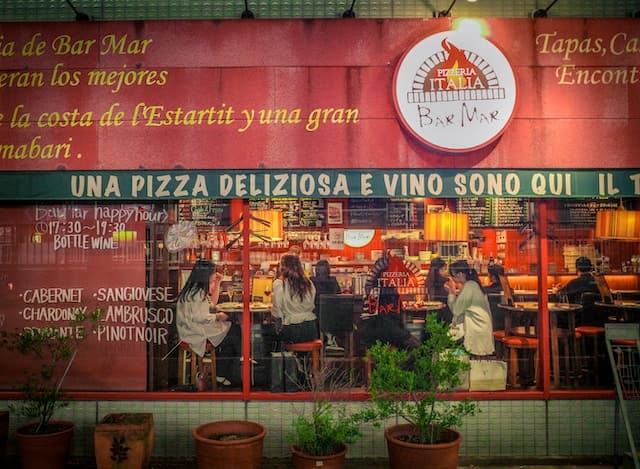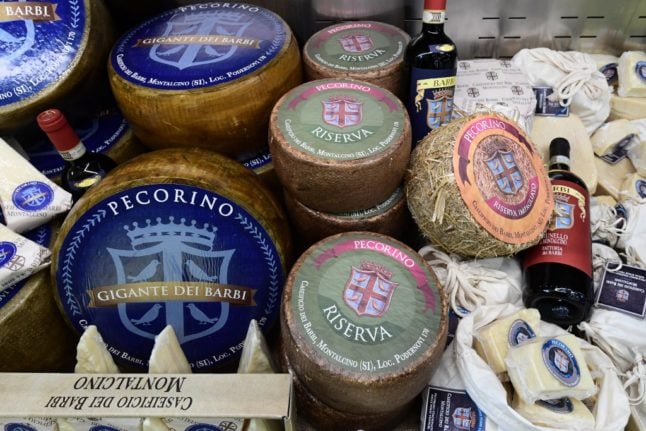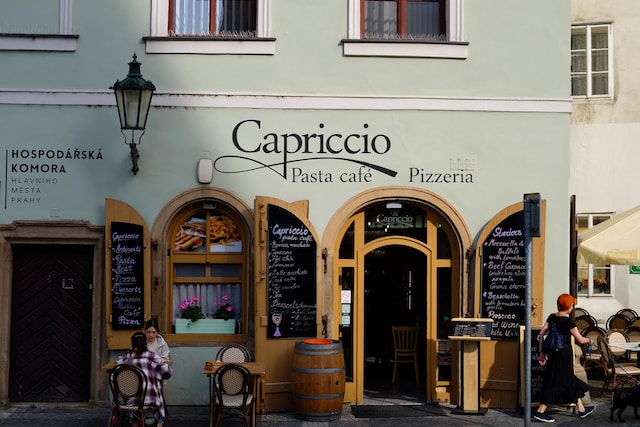How Italy’s government wants to rank Italian restaurants abroad

The Italian minister for agriculture and food sovereignty has had enough of foreign "chefs who don't know how to cook Italian" - and wants official ratings for Italian restaurants worldwide.
From banning foods that aren’t for sale yet to declaring war on the use of the English language, the current Italian government has made a long series of surprising and somewhat bizarre announcements in recent months as it promotes nativist policies it says will “protect” Italian culinary and cultural traditions.
Giorgia Meloni’s nationalist administration, which renamed the agriculture ministry the ‘Ministry for agriculture and food sovereignty’ (ministero dell'Agricoltura e della Sovranità alimentare), has been heavily focused on linking Italian food and identity as it pushes its traditional vision of the country both at home and abroad.
READ ALSO: ‘Anglomania’: Why Italy's government wants to restrict use of English words
The government’s culinary crackdown so far has focused on curbing food innovations in Italy - such as a proposed ban on lab-grown meat, despite the fact it isn’t approved for sale in Europe yet - and placing regulations on the sale of flour derived from insects, which is approved, but has barely roused a flicker of interest among Italian consumers.
The business ministry - now incongruously named the ‘Ministry for business and Made in Italy’ (ministero delle Imprese e del Made in Italy) - meanwhile talks tough on stopping the sale of counterfeit or "Italian-sounding" products in Europe and beyond.
This is a more serious issue: the value of the global market of foods marketed as Italian despite being produced elsewhere rose to €120bn last year according to Coldiretti, Italy’s biggest agricultural association, which says such products "confuse consumers" and "steal markets" from businesses selling the real thing.

Pecorino sheep's milk cheese made in Montalcino. Many 'Italian' cheeses and other products sold abroad do not have the labels indicating that they are made in Italy. (Photo by Miguel MEDINA / AFP)
Italian cheese in particular is frequently imitated, Coldiretti says, primarily Parmigiano Reggiano and Grana Padano, as is Parma ham and mortadella. All such authentically Italian products should be sold with labels indicating their provenance.
But as well as talk of protecting food traditions within Italy, the government also now says it wants to regulate Italian restaurant tables abroad - which may worry kitchens serving up much-loved, if unorthodox, international interpretations of Italian dishes, like spaghetti bolognese or fettuccine alfredo, as well as restaurants taking an innovative, non-traditional approach to Italian cuisine.
Italy’s minister for agriculture and food sovereignty, Francesco Lollobrigida, has proposed new regulations including a ratings system for Italian restaurants around the world to show they use “genuine Italian” products and to help diners tell them apart from establishments serving food "that has nothing to do with Italy".
READ ALSO:
- Four myths about ‘traditional’ Italian food you can stop believing
- Why claims Italian cuisine is a ‘modern invention’ have angered Italy
As well as rating the quality of the products used, Lollobrigida told news agency Reuters in an interview published on Monday that the restaurant’s entire way of serving the meal could be assessed: "It is not just about the dish... there is a way to organise the table, a way to present it, our wine, what is behind it," he said.
Italian newspaper Il Messaggero reported that Lollobrigida in March suggested the certification, which would be voluntary, may require a restaurant’s menu “to feature at least 50 percent traditional Italian dishes and recipes”, and for a restaurant to have “at least one employee capable of speaking the Italian language,” while the head chef may be required to have at least six months’ experience of working in a restaurant in Italy.
 An Italian restaurant in Prague, Czech Republic. Photo by Louis Le Pessot on Unsplash
An Italian restaurant in Prague, Czech Republic. Photo by Louis Le Pessot on Unsplash
“Enough of restaurants that claim to be Italian and use products that aren't,” Lollobrigida proclaimed when initially unveiling his plans in March.
“Enough of chefs who don't know how to cook Italian and end up becoming the butt of a joke.”
Italy’s Domani newspaper meanwhile reported that Lollobrigida had proposed employing a “task force” of Italian food tasters worldwide to check restaurant standards.
The proposal has so far been largely ignored or ridiculed by opposition MPs in Italy, while some critics pointed out that such certification systems already exist.
Popular Italian food blog Dissapore responded to the news of Lollobrigida’s announcement by asking whether “the minister thinks he can do it better and more effectively than the ‘ITA 0039 - 100% Italian Taste Certification’”, an international restaurant certification scheme created by Coldiretti in collaboration with food safety and education authorities.
READ ALSO: Why do Italians get so angry if you mess with classic recipes?
Dissapore noted that this scheme is already being used successfully to certify, for example, Italian pizzerias in France which meet certain quality standards. Meanwhile, Italy’s Chamber of Commerce has long been working on a similar joint project with the National Tourist Research Institute. Either of these existing initiatives could perhaps be used by the government, it suggested.
Lollobrigida’s own proposal is still in the very early stages. It has not been approved by ministers, and would need to go through a lengthy implementation process before becoming reality - so chefs serving Italian cuisine abroad won’t have to worry about being rated by the Italian government just yet.
While no official details of the planned regulations have been confirmed at this point, we think it's safe to say that featuring Hawaiian pizza on the menu will probably void any restaurant's chances of approval.
Comments (1)
See Also
From banning foods that aren’t for sale yet to declaring war on the use of the English language, the current Italian government has made a long series of surprising and somewhat bizarre announcements in recent months as it promotes nativist policies it says will “protect” Italian culinary and cultural traditions.
Giorgia Meloni’s nationalist administration, which renamed the agriculture ministry the ‘Ministry for agriculture and food sovereignty’ (ministero dell'Agricoltura e della Sovranità alimentare), has been heavily focused on linking Italian food and identity as it pushes its traditional vision of the country both at home and abroad.
READ ALSO: ‘Anglomania’: Why Italy's government wants to restrict use of English words
The government’s culinary crackdown so far has focused on curbing food innovations in Italy - such as a proposed ban on lab-grown meat, despite the fact it isn’t approved for sale in Europe yet - and placing regulations on the sale of flour derived from insects, which is approved, but has barely roused a flicker of interest among Italian consumers.
The business ministry - now incongruously named the ‘Ministry for business and Made in Italy’ (ministero delle Imprese e del Made in Italy) - meanwhile talks tough on stopping the sale of counterfeit or "Italian-sounding" products in Europe and beyond.
This is a more serious issue: the value of the global market of foods marketed as Italian despite being produced elsewhere rose to €120bn last year according to Coldiretti, Italy’s biggest agricultural association, which says such products "confuse consumers" and "steal markets" from businesses selling the real thing.

Italian cheese in particular is frequently imitated, Coldiretti says, primarily Parmigiano Reggiano and Grana Padano, as is Parma ham and mortadella. All such authentically Italian products should be sold with labels indicating their provenance.
But as well as talk of protecting food traditions within Italy, the government also now says it wants to regulate Italian restaurant tables abroad - which may worry kitchens serving up much-loved, if unorthodox, international interpretations of Italian dishes, like spaghetti bolognese or fettuccine alfredo, as well as restaurants taking an innovative, non-traditional approach to Italian cuisine.
Italy’s minister for agriculture and food sovereignty, Francesco Lollobrigida, has proposed new regulations including a ratings system for Italian restaurants around the world to show they use “genuine Italian” products and to help diners tell them apart from establishments serving food "that has nothing to do with Italy".
READ ALSO:
- Four myths about ‘traditional’ Italian food you can stop believing
- Why claims Italian cuisine is a ‘modern invention’ have angered Italy
As well as rating the quality of the products used, Lollobrigida told news agency Reuters in an interview published on Monday that the restaurant’s entire way of serving the meal could be assessed: "It is not just about the dish... there is a way to organise the table, a way to present it, our wine, what is behind it," he said.
Italian newspaper Il Messaggero reported that Lollobrigida in March suggested the certification, which would be voluntary, may require a restaurant’s menu “to feature at least 50 percent traditional Italian dishes and recipes”, and for a restaurant to have “at least one employee capable of speaking the Italian language,” while the head chef may be required to have at least six months’ experience of working in a restaurant in Italy.

“Enough of restaurants that claim to be Italian and use products that aren't,” Lollobrigida proclaimed when initially unveiling his plans in March.
“Enough of chefs who don't know how to cook Italian and end up becoming the butt of a joke.”
Italy’s Domani newspaper meanwhile reported that Lollobrigida had proposed employing a “task force” of Italian food tasters worldwide to check restaurant standards.
The proposal has so far been largely ignored or ridiculed by opposition MPs in Italy, while some critics pointed out that such certification systems already exist.
Popular Italian food blog Dissapore responded to the news of Lollobrigida’s announcement by asking whether “the minister thinks he can do it better and more effectively than the ‘ITA 0039 - 100% Italian Taste Certification’”, an international restaurant certification scheme created by Coldiretti in collaboration with food safety and education authorities.
READ ALSO: Why do Italians get so angry if you mess with classic recipes?
Dissapore noted that this scheme is already being used successfully to certify, for example, Italian pizzerias in France which meet certain quality standards. Meanwhile, Italy’s Chamber of Commerce has long been working on a similar joint project with the National Tourist Research Institute. Either of these existing initiatives could perhaps be used by the government, it suggested.
Lollobrigida’s own proposal is still in the very early stages. It has not been approved by ministers, and would need to go through a lengthy implementation process before becoming reality - so chefs serving Italian cuisine abroad won’t have to worry about being rated by the Italian government just yet.
While no official details of the planned regulations have been confirmed at this point, we think it's safe to say that featuring Hawaiian pizza on the menu will probably void any restaurant's chances of approval.
Join the conversation in our comments section below. Share your own views and experience and if you have a question or suggestion for our journalists then email us at [email protected].
Please keep comments civil, constructive and on topic – and make sure to read our terms of use before getting involved.
Please log in here to leave a comment.